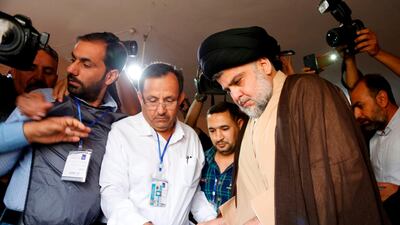The Iraqi parliament has urged an investigation into allegations of vote fraud in this month's general election, passing a resolution seeking a partial recount.
The non-binding resolution seeks to cancel ballots cast from overseas and within displacement camps inside the country and would require 10 per cent of all votes to be manually recounted.
If cheating were discovered it could lead to a recount of all ballots nationwide.
The move by MPs follows protests over alleged vote rigging on May 12. The proposed recount would be compared to electronic tallies, to address concerns that electronic voting machines had been hacked.
"In case of discovery of fraud, then a recount would be carried out for all votes across the country," Abdel Malik Al Husseini, spokesman for the speaker of parliament, told The National.
Parliament held the emergency session on Monday night to pass measures aimed at restoring confidence in the elections, Mr Al Husseini said.
With 168 of parliament's 328 MPs present, the resolution sought to “annul diaspora votes and votes that were conducted in displaced camps in Anbar, Salahuddin and Diyala provinces.”
The resolution does not compel Iraq's Independent High Electoral Commission (IHEC) to take action however, as parliament does not have authority to issue it specific instructions.
"This was a non-binding resolution, whatever Iraqi MPs say, they have no authority to pass legislation cancelling votes or requiring anything regarding an election. It means nothing," Iraq analyst Kirk Sowell tweeted.
Voting in this year's election was conducted electronically for the first time, in an effort to combat perceptions of voter fraud. However, even before polls closed a number of politicians and monitoring groups raised concerns that the machines could be hacked.
Iraq's speaker of parliament, Salim Al Jubouri, called on Iraq’s Integrity Commission and judicial authorities to “maintain a democratic electoral process”.
Mr Al Jubouri said that "authorities must ensure that tampering and voter irregularities are eliminated from elections".
__________
Read more:
Angry Iraqi Kurds file election complaints with Baghdad
Iraqi supreme court rejects appeal to cancel election results
Iraqi Prime Minister dismisses demands for repeat election
__________
On May 17, Jan Kubis, the UN's special envoy to Iraq, called on Iraq's IHEC to investigate complaints of voting irregularity to strengthen confidence in the electoral process. “The commission has to act expeditiously in order to seriously address all complaints including, as necessary, the conduct of partial manual recount in selected locations, notably in Kirkuk," he said.
IHEC says it has already invalidated ballots from 103 polling stations in five provinces. Prime Minister Haider Al Abadi has said that accusations of fraud will be investigated.
The demand for a recount may be politically motivated, some Iraqi politicians argue. "Losers are losing," tweeted former finance minister Hoshyar Zebari.


